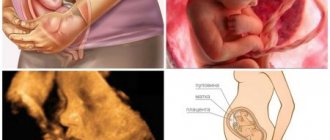Pregnancy is one of the most beautiful and difficult stages of life for a woman. Over 9 months, the body of the expectant mother changes; if at the very beginning it was without extra pounds and stretch marks, then by the end of the 8th month everything changes. Therefore, the main issue worrying expectant mothers is how to lose weight during pregnancy so as not to harm your own body and the baby in the womb.
Pros and cons of losing weight during pregnancy
The main advantages for which you should strive to lose weight while expecting a child include:
- Getting rid of the gained kilograms in combination with physical exercise can improve the well-being of a pregnant woman, normalize her sleep, and give her vigor.
- Exercise can help you avoid gestational diabetes. In this condition, the blood sugar level rises to a dangerously high level, which threatens the life of the woman, as well as the fetus. In some cases, high sugar levels can cause complications during childbirth.
- If you adhere to the principles of proper nutrition and consume large amounts of fresh vegetables and fruits, your weight will gradually decrease.
The disadvantages of losing weight during pregnancy include:
- Difficult pregnancy if the initial weight of the pregnant woman was insufficient or within normal limits.
- Dieting or fasting can lead to a deficiency of beneficial microelements, which is why the child in the womb will lag behind in development.
When does a pregnant woman really need to lose weight?
During a normal pregnancy, weight gain at the end of the first trimester should be approximately 2 kg, at the end of the second - 6-7 kg, at the end of the third - 12-15 kg.
This number is made up of the following indicators:
- 4-5 kg - enlarged uterus, mammary glands, placenta;
- 3-4 kg - estimated fetal weight;
- 2.5-2.6 - weight of amniotic fluid;
- everything else is the mass of fat on the stomach, hips, back, arms, etc.
Of course, this number also depends on the woman’s initial body mass index - if you were underweight before pregnancy, you can safely gain a little more kilograms while pregnant. But gynecologists advise curvy ladies not only to closely monitor weight gain, but also to seriously think about how to lose weight even before pregnancy.
An experienced gynecologist will help you determine exactly whether you really need to lose weight. To do this, you will have to take a general blood test, a urine test and undergo an ultrasound examination (it will show what condition the fetus is in). And if the doctor, after carefully studying the test results and the history of body weight growth, recommends going on a diet, you need to take active action.
Reasons for weight gain during pregnancy
Weight gain during pregnancy is formed from the following indicators:
- At the beginning of pregnancy, the body makes reserves in the form of fat deposits, the mass of which is equal to 1.5 kg. This happens so that the unborn baby is protected from various external influences.
- Amniotic fluid reaches a weight of 1 kg.
- At birth, the baby's weight is about 3.5 kg.
- The weight of the placenta is 0.7 kg.
- The increase in mammary glands, blood volume and uterus is equivalent to 2 kg.
Based on these indicators, the optimal gain during pregnancy is 10 kg. If a pregnant woman’s weight gain is much lower before giving birth, this indicates that gradual weight loss occurred over the 9 months of gestation.
Weight loss may be due to the following reasons:
- Toxicosis.
- Fasting, strict diets, deliberate refusal to eat.
- Depression, stress, poor financial situation, due to which the pregnant woman could not eat properly.
- Diseases.
The dangers of excess weight during pregnancy
Expectant mothers who have gained a significant amount of extra pounds while carrying a baby may experience the following problems:
- increased blood pressure;
- the occurrence of edema;
- development of gestosis (severe complication of pregnancy);
- early aging of the placenta.
Well, for the fetus, the gastronomic preferences of the mother can come back to haunt them with oxygen starvation and an increase in body weight, which significantly complicates the natural process of birth (babies whose weight exceeds 4 kg are usually cesareaned).
That is why very often pregnant women think about the question: how can you lose weight during pregnancy? After all, a strict restriction in nutrition, a strict diet can lead to the fact that the baby begins to experience a deficiency of nutrients that are so necessary for his growth, development and the formation of immunity, and this will inevitably affect his health...
How then can a pregnant woman lose weight without harming herself or her precious baby? Let's look into this issue.
How to lose weight during pregnancy without harm
To lose weight during pregnancy without harm to your health, follow these recommendations:
- Eat healthy food, exclude alcohol, flour, sweet, fatty, smoked products from your diet.
- Include foods containing large amounts of vitamins and important microelements in your diet.
- Eat small meals.
- Follow a special diet designed for the last months of pregnancy.
The concept of healthy, living food includes the following definitions:
- Every morning before meals you should drink juice from vegetables or fruits. It is best to drink carrot and lemon juice if you are not allergic to these products, but it is advisable to dilute them with water.
- Before going to bed, it would not be a bad idea to drink honey along with sour juice.
- Drink plain water, but in small quantities, so that it does not cause swelling.
- Add whole foods to your regular diet.
- Do not eat large quantities of meat products and meat itself. You can find protein in fish, dairy products, and nuts. Try to keep your diet varied.
- Try to reduce the amount of salt you consume, as it retains fluid in the body and causes increased thirst.
- It is advisable to reduce the amount of cooking you do to your food. Steam food, bake it in the oven, give up frying in favor of boiled and stewed foods.
When taking vitamins, you should remember that their excess, as well as their deficiency, can negatively affect the body. Try to get important microelements not from complex vitamins, but from fresh vegetables and fruits. Give preference to freshly prepared juices instead of those found on store shelves.
Many pregnant women suffer from calcium deficiency, so doctors persistently prescribe them various tablets that increase calcium levels in the body. In the last months of pregnancy, this risks the baby’s bones becoming calcified, which will make it more difficult for the baby to move through the birth canal.
In the last 3 months of pregnancy, doctors recommend that expectant mothers consume as many vegetables and fruits as possible. Thus, the weight does not increase, but even decreases, and the pregnant woman’s well-being improves.
3 weeks before giving birth, it is necessary to remove dairy products, which are a source of calcium, from the diet. It would not be superfluous to give up flour products and sweets, which cause excess weight gain but do not provide any benefit to the body.
If a pregnant woman cares about her weight and follows all the above tips, then her weight gain during the period of bearing a child will be within normal limits, and the baby will be born strong and healthy. If you neglect all the advice, then in the future this will lead to various complications, as well as problems with weight loss after childbirth.
- Related Posts
- Rosehip during pregnancy
- Uterine fibroids during pregnancy - causes, symptoms and treatment
- How to take folic acid during pregnancy
« Previous entry
How to lose weight without harming your child
Nutrition is, of course, the first thing a future mother should pay attention to. The main mistake of all women trying to lose weight is the use of one or another specific diet, which involves either severe dietary restrictions or regular consumption of the same product (so-called mono-diets).
You should remember once and for all: as such, there cannot be a weight loss diet for pregnant women!
During pregnancy, only two safe methods can be used to reduce body weight:
- adhere to a rational, balanced diet in reasonable quantities;
- lead a healthy, active lifestyle throughout the entire period.
Losing weight at different stages of pregnancy
Losing weight in the early stages of pregnancy is much easier than later.
First trimester
In the first trimester, you need to include as many protein foods as possible in your diet. At this time, the baby develops all vital organs. For proper development, many protein molecules (more precisely, their components - amino acids) are required. If certain amino acids are deficient, organ development may be impaired. This is a very dangerous condition, as defects and anomalies appear in the organs.
Second and third trimesters
In the first and second trimester, try to eat more protein foods (chicken, turkey, fish, beef, lean pork and dairy products). You can eat legumes. They contain a lot of vegetable protein. But don't overdo it!
Excessive consumption of peas or beans can cause excessive gas and bloating. This has an adverse effect on the baby.
From the middle of the second trimester and throughout the third trimester, it is important to pay special attention to the numbers on the scale. If the expectant mother is addicted to salty foods, severe swelling and weight gain may occur. Swelling most often appears on the legs. In this case, it will be very difficult to move. The face may swell. Usually in such cases, doctors recommend using diuretic herbs and completely eliminating foods that contain a lot of table salt. Cranberry or lingonberry juice are great helpers in the fight against swelling!
What to eat to lose weight during pregnancy?
The growing body will definitely take everything it needs from the mother, but the lack of nutrients in the body of a pregnant woman will not affect her health.
It is advisable to completely remove baked goods and any flour products from your diet. If you can’t bear without sweets, eat a small dessert before 12 noon. It is better if sweets are replaced with dried fruits or fruit yogurt.
Avoid fried, fatty and smoked foods. All this harms the baby and can lead to problems with the gastrointestinal tract. Steam or grill. Give preference to plant foods that have undergone minimal heat treatment. Regularly eat fish, poultry and lean meat, as these are the main suppliers of protein in the body. From dairy products, choose kefir, low-fat yogurt without additives and cottage cheese. Cheese is a fairly high-calorie product: a couple of slices per day is enough.
Fats are also necessary for the expectant mother; the main thing is to consume healthy fats that are involved in the process of hematopoiesis. These are vegetable fats (olive, sunflower, flaxseed, corn), fatty sea fish (salmon, mackerel, herring, perch, etc.)
Fruits and greens should constantly appear in the diet of a woman expecting a child. Experiment, use your imagination, because if you feel hungry between meals, then fruit salads, fresh juices and vitamin juices will help you. Then neither you nor your baby will experience a lack of vitamins and fiber. Also, do not forget bread made from wholemeal flour, to which bran, malt, and seeds are added - this should also be included in the diet. Porridges from various cereals, muesli and durum wheat pasta will provide the necessary carbohydrates.
What kilograms are considered “extra”?
Definitely, expectant mothers gain weight most often in the second half of pregnancy. During the 1st trimester, it is considered normal to gain from 1.5 to 2 kilograms, that’s all. Reviews from my relatives and friends confirm that many women even lose weight in the early stages, in the first 3 months - including due to toxicosis.
In the second trimester, a woman can gain up to five and a half kilograms, and this will also be considered normal. If she was overweight before pregnancy, it would be no more than three and a half. After 32 weeks, body weight increases significantly.
In total, the weight may exceed the initial one by 11 kilograms. And until the end of pregnancy, in total, it is permissible to become heavier by 13.5 kilograms, or by 9 if the weight was higher than normal initially. Everything else is extra pounds, and they need to be removed, that is, mommy needs to lose weight.











